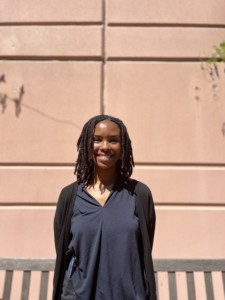PRAIRIE VIEW, Texas (Nov. 21, 2022) – Edom Kidane and Grace Brooks hope their efforts will train and raise the next generation of Black girls they call beautiful, unique and “capable of anything.”
The two Prairie View A&M University students were recently selected as 2022-2023 Albert Schweitzer Junior Fellows. They are partnering on a fellowship project called Sisters Building Sisters.
“This fellowship has been inspiring to be a part of,” Kidane said. “I am able to empower my community and provide young girls with the resources and guidance I lacked as a Black girl from a disadvantaged background.”
This school year, the Albert Schweitzer Fellowship Houston Galveston is mentoring 67 graduate student senior fellows and 11 undergraduate junior fellows. Kidane and Brooks join approximately 250 other 2022-23 Schweitzer fellows at 13 chapters nationwide.
The fellows are partnering with local community-based organizations to develop and implement yearlong mentored service projects to improve underserved communities’ health and well-being.
The Project
As founders of their community program, Sisters Building Sisters, Kidane and Brooks are serving a group of girls at YES Prep White Oak Secondary in Houston. Sisters Building Sisters seeks to offer a curriculum focused on mental health, women’s health, stress relief, self-esteem, healthy relationships and higher education.
“The project’s goal is to empower Black girls by addressing this population’s absence of mental, social and academic-oriented resources,” Brooks said, calling it “a supportive community-oriented sisterhood.”
“We aim to establish a safe space for young girls of color to express themselves unapologetically,” Kidane said, adding they seek to help young girls of color from disadvantaged socioeconomic backgrounds.
Kidane and Brooks hope to facilitate an environment where Black girls can have open, productive conversations about women’s health, mental health and other topics that can sometimes be neglected from general discussion. They also hope to connect them to resources they may not even realize are available.
“I believe our community project can impact the lives of many young girls and aid in boosting their self-confidence and comfort in their own skin,” Kidane said, adding she also hoped the project could continue beyond the fellowship year with the next group of PVAMU students.
Their Purpose
Kidane and Brooks both come from similarly disadvantaged backgrounds as the girls they want to help. They hope to provide not only resources, support and guidance but their own stories.
“Coming from a low-income immigrant family, I did not have the resources I desperately needed,” said Kidane, a first-generation American and college student. Her family is from Ethiopia. “It was not until I arrived at PVAMU that I received the resources, representation and nurturing environment I craved as a young girl.”
And thus, the idea and inspiration for Sisters Building Sisters was born.
“Growing up in an underserved community, I did not have access to resources that would assist me through my educational and emotional needs,” said Brooks. “While attending Prairie View, I have had the opportunity to learn from Black women and my classmates and have been encouraged ever since. It is important to create safe spaces for Black girls and girls of color based upon the oppression and neglect that has been embedded in society. Our mission is to empower the girls and present to them that they can be what they are inspired to become, no matter what obstacles are put in place that is meant to deteriorate us!”
The Fellowship
Quincy C. Moore III, director of the PVAMU Honors Program, serves as the fellowship liaison and administrator.

Pictured from left to right: ASFHG Board Chair Sean Haley, ASFHG Executive Director Andrea Link, Brooks, Kidane, and Moore
“It’s all about impacting underserved communities,” Moore said. “It’s a way for students, as they matriculate through their college education, to give back to others who aren’t as fortunate.”
In addition to mentorship and partnership with community agencies, fellows receive leadership training and project management development to support the completion of their respective projects.
“This year’s class of fellows reflects an extraordinary range of diversity,” said ASFHG Executive Director Andrea Link. “Almost 80% of our fellows and scholars are individuals of color, and 20% are the first in their families to graduate from college. We celebrate this diversity and believe it contributes to the success of our fellows’ projects.”
The fellowship boasts 56,000 hours of service, 307 fellows trained, and over 12,000 people served in areas including homeless health, mental health, children’s health, women’s health, refugee and immigrant health, environmental health, racism, special needs, disability care, and more.
“The fellowship allows me to become more familiar with various issues impacting underserved communities,” Kidane said. “I am devoted to building my understanding through exposure and community service to become best suited to create effective solutions and serve these communities as a future physician.”
Their Future
Once she graduates in 2024, Kidane, a junior majoring in chemistry, hopes to earn an MD and JD to specialize in medical malpractice. “As a future physician, I am dedicated to serving underrepresented and marginalized communities,” she said. “There’s a disconnect between people of color, particularly black communities, and the medical community due to the persistence of racist medical beliefs and practices.” She wants to “rebuild trust between minority and underrepresented populations and the medical community.”
After she graduates in 2023, Brooks, a senior majoring in political science, aims to become a civil rights lawyer who helps those wrongfully convicted and pursue policy reform to make a difference in the justice system. “I want to engage in political action and create laws that will help benefit vulnerable individuals and their families and put an end to unlawful activities that continue to be prevalent in underserved communities,” Brooks said.
They hope their stories will inspire the next generation: “Black women and girls have infinite potential to make a difference in any desired field of passion,” they said.
By Christine Won
-PVAMU-





